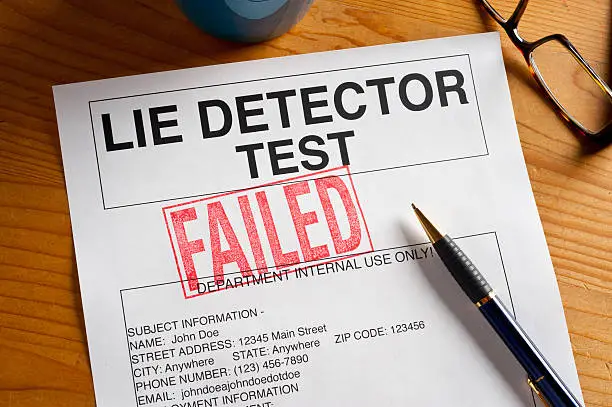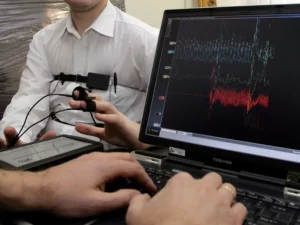A polygraph test, also known as a lie detector, is used to detect an individual’s truthfulness by measuring physiological responses. The assumption is that if you are lying, you will experience increased sweating, heart rate, and blood pressure.
The test is divided into four segments: the pre-test and interrogation phase, the examination, and the post-test.

Strictly speaking, it is impossible in many countries to “fail” a polygraph. Nevertheless, there are several ways that an individual can be seen to “fail” the test.
In this article, we discuss failed polygraph scenarios and the appeal procedure, based on our own direct experience.
If you have unjustly failed a polygraph examination, we provide individualized consultation services for the appeal procedure.
Common reasons for failing a polygraph test
Nervousness and anxiety
When you’re asked questions about potentially sensitive or incriminating topics, it’s natural to feel nervous and anxious. However, these can also lead to physical symptoms that interfere with accuracy. Your heart rate may increase, you may start to sweat, or your breathing may become shallow and rapid. These can be interpreted as indicators of deception.
Studies have shown that anxiety could potentially have a significant impact on the results. One found that individuals who were more nervous were more likely to produce false positives, meaning that they were labeled as deceptive even when they were telling the truth. Similarly, individuals who were less anxious were more likely to produce false negatives, meaning that they were labelled as truthful even when they were lying.
Physical or mental health conditions
Physical and mental conditions can also affect accuracy. For example, if you have a heart condition, a respiratory illness, or chronic pain, they cause physical symptoms that may be interpreted as indicators of deception. Similarly, mental health conditions such as anxiety disorders, depression, and post-traumatic stress disorder (PTSD) can cause hyperarousal, hypervigilance, and emotional numbing, which can be mistaken for deceit.
There are also certain medications that can affect precision. For example, ones that affect heart rate, blood pressure, or respiratory function.
If you have any of these, it’s important to disclose them prior to the test. This can help them interpret any symptoms that may arise in the appropriate context.
Additionally, if you are taking any medications, inform them as well. He may recommend that you temporarily discontinue the medication, or they may adjust the procedure to take into account the potential impact.
Previous trauma or experience with law enforcement
Prior trauma or negative experiences with authorities can also impact results. If you have a history of or have experienced police brutality or harassment, you may be more likely to exhibit symptoms of anxiety or nervousness during the test.
It’s important to disclose any relevant experiences to the examiner prior to the test. This can help the examiner interpret any physical or emotional symptoms that may arise during the test in the appropriate context.
Common mistakes made during polygraph tests that lead to failure

Answering questions too quickly or too slowly
Polygraphs measure physiological responses, and if you answer questions too fast or too slowly, it may be difficult to get accurate readings.
Trying to manipulate the test
Some may try to cheat the test by using various techniques that regulate their physiological responses. However, these are usually ineffective, and can lead to failure. Doing so can result in false positives due to the abnormal data you may produce. Additionally, many examiners are trained to detect when an individual is using countermeasures, which can lead to additional consequences.
Manipulation types include:
- Try to remain apathetic during the whole test.
- Trying to hold your breath or change your breathing pattern
- Trying to cause yourself pain by biting your tongue
- Use mental countermeasures.
unintentionally disrupting the results
It is advisable not to consume any food or drink, smoke, chew gum, or use the restroom within 30 minutes of the test. You should nonetheless retain regular eating habits until that point.
Overeating or skipping meals before might cause discomfort and a loss of attention; if done excessively, it can also alter your physical recordings.
Not being able to get a good night’s sleep can also cause the same effect. If possible, you should consider your schedule; If you work late, for instance, avoid taking the test early in the morning.
Additionally, it is recommended not to wear tight clothing that could restrict your movement. Doing so can result in unwanted, modified physical recordings.
failing to fully understand the questions
It’s important that you completely understand the questions. If you misinterpret one, your physiological and mental responses could be completely different due to different perceptions of information.
An examinee can also fail if he cannot control his physiological responses to any of the questions asked or if they are not relevant to their case. When they are irrelevant, it can be difficult to remain calm, leading to abnormal physical reactions.
Possible results
There are four possible results:
- Successful: When “No Deception Indicated” (NDI) is your result, you have passed the examination and have been judged to have answered the questions honestly.
- Failed: A result of “deception indicated” (DI) is a failure of the test, and the examiner or the machine has decided that your physical responses to the questions show that you were not telling the truth.
- Inconclusive: An inconclusive result means that the scores recorded on your physical reactions chart have not been sufficiently indicative of whether you are being honest or lying. This is not a pass or fail for the exam.
- Purposely Non-Cooperative (PNC): You were caught trying to use countermeasures during the test or did not comply with the given instructions.
False positives and false negatives

False positives occur when the test indicates that you are lying when you are actually telling the truth. This can happen if you are exceptionally nervous or anxious or if you are incorrectly accused of wrongdoing.
False negatives, on the other hand, occur when the test indicates that you are telling the truth when you are actually lying. This can occur if you are able to entirely control your physiological responses or fully convince yourself that you are telling the truth (usually psychopaths).
Both false positives and false negatives can have serious consequences. If you are falsely accused, you may suffer legal or professional repercussions, such as losing your job or being convicted of a crime you did not commit. If you are falsely cleared of lying, you may be able to get away with a crime or illegal behaviour, which can easily cause harm to others.
Consequences of failing in specific professions or industries
Law enforcement
Regarding law enforcement, a failed polygraph test can lead to your disqualification from the application process or even the loss of your current job. This is because agencies view the ability to pass a test as a crucial indicator of honesty and integrity. For example, if you are applying to become a police officer and fail a polygraph on questions related to illegal drug use, you may not be hired because it could compromise your ability to carry out your duties effectively and without bias.
National security
Similarly, in the national security sector, a failed polygraph test can lead to the denial of security clearance, which is required for many positions in this field. Security clearance allows you to access classified information that could potentially harm national safety if it falls into the wrong hands. Thus, the government takes the process very seriously, and a failed test can be a significant obstacle to obtaining it.
Private sector
In the private sector, consequences can vary depending on the job and the employer. Some private sector recruiters may require a polygraph as part of their hiring process, particularly in industries such as finance or defense contracting. Failing the test could result in your disqualification from the process, and could also lead to termination if you are already employed.
How to appeal a failed polygraph test

When you fail during the application process for a job, security clearance, or other position, you may have the opportunity to appeal the results. The process varies depending on the organization or agency administering the test, but generally, the steps involve the following:
- Request a copy of your test results: The first step is to request a copy of your test outcomes. This will allow you to review the questions asked and the answers you gave to identify any potential errors.
- File an appeal: Once you reviewed your results and identified any potential errors, you can file an appeal with the body or entity that administered the test. You may need to provide additional evidence or documentation to support your appeal.
- Review by an independent reviewer: In some cases, the appeal may be reviewed by an independent examiner who has expertise in polygraph testing. He will examine your test and any additional evidence you provide to determine if the original findings were accurate.
- Decision on the appeal: After the appeal has been reviewed, they will make a decision on whether to uphold the original outcomes or overturn them. If your appeal is successful, you may be given the opportunity to retake the test.
Basic guidelines to follow when appealing
There are certain requirements you must meet before you can file an appeal. They vary depending on who administered the test, as well as the state where the test was conducted. But here are some general requirements to keep in mind:
- Understand the process: Before you begin the appeal, understand how it works. You should familiarize yourself with the rules and regulations of the organization that administered it, as well as the specific grounds for appeal that are recognized.
- File a written appeal: Most agencies require you to file a written letter in order to contest the result. This should outline the reasons why you believe the test was inaccurate, and it should include any supporting evidence or documentation that you have.
- Meet deadlines: There are typically strict deadlines that you must meet when filing an appeal. Make sure you understand these and submit your letter within the required timeframe. Failure to do so may result in your appeal being rejected.
Tips for preparing an appeal effectively
- Gather evidence: Gather as much evidence as possible to support your appeal. This can include medical records, witness statements, and any other documentation that may be relevant to your case.
- Be prepared to explain your behavior: If the results were based on your attitude during the test, be prepared to explain it. This can include providing information about any medical conditions or medications that may have affected you.
- Address any procedural errors: If there were any procedural violations during the test, such as improper administration, this can be used as a ground for appeal.
- Be specific: When preparing your letter, be specific about the grounds for appeal and the evidence that supports it.
- Be respectful: Even if you disagree with the results, be respectful and professional. This will help you build credibility and increase your chances of a successful appeal.
- Follow up: After presenting your case, make sure to follow up to find out the status of your appeal. This will help you stay updated and prepared for the next steps in the process.
By following these and preparing your case effectively, you can increase your chances of a successful appeal.
Can a failed polygraph test be used as evidence in court?

In the United States, each state has its own rules about whether or not polygraph results can be used in court. In general, failed tests are not admissible in criminal trials, but may be admissible in certain civil cases or administrative proceedings.
The main reason for this is that their reliability has been the subject of much debate and controversy. Many experts argue that they are not scientifically trustworthy and they are subject to interpretation and manipulation by the examiner.
Moreover, their use in court can raise serious issues related to the defendant’s right to remain silent, their right to a fair trial, and the potential for prejudicial impact on the jury.
Despite these, some states still allow results to be used as evidence under specific circumstances. For example, in some, a defendant may choose to take a polygraph voluntarily, and if the results are favourable, he may be able to introduce them. Additionally, some states allow tests to be used in plea negotiations or in cases where the defendant has made inconsistent statements.
Case study
One notable case involves former CIA officer Aldrich Ames. In 1994, Ames failed a polygraph, which ultimately led to his arrest and conviction for espionage. The examination was conducted as part of a routine security check, and Ames was asked about his involvement in unauthorized activities. Despite initially denying any involvement, the polygraph indicated that he was lying. After further investigation, it was discovered that Ames had been selling classified information to the Soviet Union for years.
Emotional and psychological impact
Failing a polygraph test can be a highly emotional and psychologically taxing experience. The process of taking the test alone can be anxiety-inducing, as it involves being hooked up to various sensors while answering a series of questions. However, the impact of failing the test can be even more profound.
It can be a devastating blow to their self-esteem and confidence. Failing can be seen as an admission of guilt, even if the person is innocent. The experience of being accused of something and then being unable to prove your innocence can be extremely damaging to a person’s mental health.
In addition to the immediate effects of failing, there can also be long-term consequences. For example, if a person fails a test during a job interview, they may have difficulty finding employment in the future. Similarly, if a person fails a test during a criminal investigation, they may be viewed with suspicion by law enforcement officials for years to come.
The psychological impact can be particularly severe for those who have been falsely accused. The experience of being accused and then being unable to prove your innocence can be extremely traumatic. The psychological effects of this type of trauma can include anxiety, depression, and post-traumatic stress disorder (PTSD).
If you fail a polygraph, it is important to take care of your mental and emotional well-being. Seek support from friends, family, or a mental health professional if needed. It is also important to remember that you have the right to appeal the test results and to challenge the accuracy of the test.


